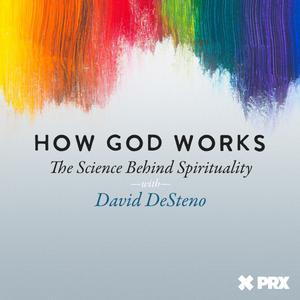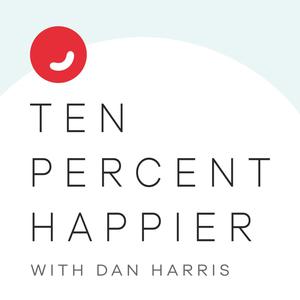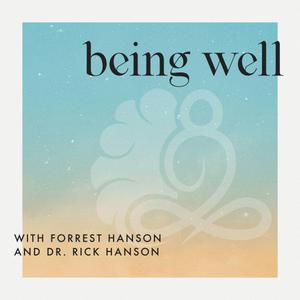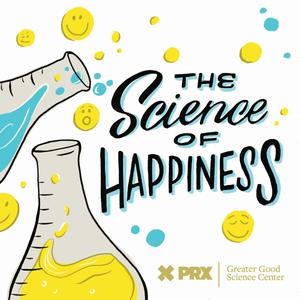
How God Works: The Science Behind Spirituality
David DeSteno
Join Dave DeSteno as he speaks to leading scientists, spiritual teachers, and religious leaders to explore what we can learn from faith practices ranging from meditation and prayer to psychedelics and fire-walking. He’ll look at how we can adapt and use spiritual practices in our own lives, whatever our beliefs -- including none at all.
- 38 minutes 54 secondsThe Bad Place
Lots of religions embrace the idea of hell – a place of eternal punishment for wrong doers. But where did that idea come from? How has it changed through time? And how does a belief in it (or not) affect us while we’re alive?
We’ll talk with Bart Ehrman about the history of beliefs in hell from ancient Mesopotamia through modern Christianity. And with Shadi Hamid about why he thinks it can be a good thing for people to believe in hell, and how that belief shapes our political and social lives.
Bart Ehrman is the James A. Gray Distinguished Professor at the University of North Carolina at Chapel Hill, and the author of Heaven and Hell: A History of the Afterlife and Journeys to Heaven and Hell: Tours of the Afterlife in the Early Christian Tradition. Find out more about Bart’s work, including his many other writings about the New Testament and early Christianity, at his website.
Shadi Hamid is a columnist at The Washington Post, a contributing writer at The Atlantic, and a research professor of Islamic studies at Fuller Seminary.
24 November 2024, 10:30 am - 35 minutes 30 secondsNear Death Experiences
People have been having Near-Death Experiences (NDEs) all over the world for as long as we can look back into history. And the strange thing is… these experiences seem to have a lot in common. Why? Is it a look into the afterlife? Is it just our neurons firing in weird ways as the brain dies?
We’ll talk to psychiatrist Bruce Greyson, one of the world’s leading experts on Near-Death Experiences, about the research that led him to rethink his understanding of the nature of life, death, and the continuity of consciousness. We’ll explore the science behind how these experiences can provide comfort, heal past trauma, and even create transcendent experiences that help us make as much sense of our lives as of impending death. And we’ll also consider the bigger question of what NDEs suggest, if anything, about our understanding of reality.
Bruce Greyson, M.D. is the author of “After: A Doctor Explores What Near-Death Experiences Reveal About Life and Beyond.” Find out more about his book, and his over 45 years of experience researching NDEs, on his website.
Here are links to the recordings of people you heard talking about their NDEs throughout the episode: Sharon Stone, Dr. Mary Neal, Renee Pasarow, Cherie Aimee, Jayne Smith.
Here’s a video of Dr. Gregory Shushan talking about his research on NDEs in ancient religions.
10 November 2024, 10:30 am - 37 minutes 8 secondsSo You say You’re a Cynic
There’s no question we’re living in difficult times that lead many of us to adopt a cynical outlook. But while cynicism might feel smart, science shows it’s corrosive not only to our own wellbeing, but to society as a whole. We’ll talk to Stanford Professor of Psychology Jamil Zaki about the surprising benefits that a willingness to trust in the goodness of others can offer, and how to build this skill in a wise way through habits of mind and action.
We’ll also speak with political writer Peter Wehner about how cynicism leads to the political division and discord so prominent in politics today, and how religion, when practiced in its best form, can help overcome it.
Jamil Zaki is the author of the new book Hope for Cynics: The Surprising Science of Human Goodness, and the author of The War for Kindness: Building Empathy in a Fractured Word. Find out more about his work on his website.
Peter Wehner is a contributing writer for The New York Times and The Atlantic who served in three Republican administrations. He is the author of The Death of Politics: How to Heal Our Frayed Republic After Trump and City of Man: Religion and Politics in a New Era.
27 October 2024, 9:30 am - 36 minutes 1 secondSucceeding Without Trying
We spend a lot of time on How God Works talking about how spirituality can offer tools to become better versions of ourselves. And while learning to be happier, healthier and more resilient are all positive things to strive for, they can also lead us down a different path - an obsession with productivity and self-optimization… which can lead to a culture of trying to grind or life-hack our way through everything.
But what if the secret to success lies in doing less, not more? On this episode, we’ll explore the Chinese concept of wu wei, effortless action. We'll talk to Edward Slingerland about how modern cognitive science has proven many early Chinese thinkers right, why wu wei is still relevant today, and how learning how not to try can help us forge a different path toward the good life.
Edward Slingerland is a professor of religion at the University of British Columbia and the author of Trying Not To Try: Ancient China, Modern Science and the Power of Spontaneity. Find out more about his work, and his other books, on his website.
Other texts we’ve discussed during this episode include:
-Flow, by Mihaly Csikszentmihalyi
-Groundwork of the Metaphysics of Morals, by Immanuel Kant
-The Analects or Sayings of Confucius, attributed to Confucius
-The Tao Te Ching or Laozi, attributed to Laozi
-The Mencius, attributed to Mencius
13 October 2024, 9:30 am - 31 minutes 16 secondsRethinking Regret
Regret can be a double-edged sword. It can be painful, and enduring, but we can also learn important lessons from it - IF we treat it right. Most religions speak of forgiveness and compassion, not only toward others but also toward oneself. Still, letting go can be difficult to do at times. So how do we learn from regret and start anew?
Dave speaks with best selling author Daniel Pink, and renowned Buddhist teacher Sharon Salzberg to learn about the science of regret and how some spiritual wisdom and practices can help us move beyond it and begin again.
Daniel Pink is the author of five New York Times bestsellers, including his latest, The Power of Regret: How Looking Backward Moves Us Forward. Learn more about his work, and where to purchase his books, on his website.
Sharon Salzberg is a meditation pioneer, world-renowned teacher, and New York Times bestselling author. Learn more about her teachings, and find her other media appearances and books, on her website.
29 September 2024, 9:30 am - 37 minutes 14 secondsRethinking Sin
For many people, the word “sin” is associated with harsh judgment and shame. Or, it’s used to talk about guilty pleasures like consuming decadent desserts... But is this concept as harmful or outdated as it seems?
Join Dave as he talks with Elizabeth Oldfield about Christianity’s Seven Deadly Sins, and how reconceptualizing them for modern life can offer a science-backed user’s manual of sorts to find joy and connection in this world, whatever your beliefs.
Elizabeth Oldfield is host of The Sacred podcast and author of the book Fully Alive: Tending to the Soul in Turbulent Times. She also writes the Substack newsletter Fully Alive and works as a coach, consultant and facilitator. Find out more about her work on her website.
15 September 2024, 9:30 am - 1 minute 43 secondsSeason 7 Trailer
Join us for Season 7 of How God Works, starting next week!
8 September 2024, 3:00 pm - 37 minutes 50 secondsMaking God Real (2022)
We've had a lot of new listeners join us of the past year, so while we're hard at work on our next season, we thought we'd share some favorites you might have missed from the archives.
Have you ever heard a voice, seen an image, or felt a presence around you that you couldn’t explain? If you have, you’re not alone.
More people than you might think report having these kinds of experiences. For some, it can be easy to write these off as tricks of the mind. But for others, especially the religious and spiritually-inclined, these events are often transformative and can profoundly alter the way they feel about their faith. So how is it that gods come to feel real to people? What do these experiences do for those who have them? And why, sometimes, does it feel like the supernatural world is connecting with us out of the blue?
Tanya Luhrmann is an anthropologist at Stanford University. Find out more about her book, How God Becomes Real: Kindling the Presence of Invisible Others, on her website, where you’ll also find links to her other writing and media appearances.
Michael Ferguson is a neuroscientist at Harvard University. Find out more about his research and teaching through his website.
Reverend Liz Milner is ordained in the Episcopal Church. She works with prison inmates in northern California.
Episode info and transcript available here.
25 August 2024, 9:00 am - 33 minutes 51 secondsDeath (2022)
We've had a lot of new listeners join us of the past year, so while we're hard at work on our next season, we thought we'd share some favorites you might have missed from the archives.
As a society that fears death, we tend to avoid the subject. But the key to having a positive end-of-life experience might come in doing just the opposite.
On this episode, we’ll hear from philosopher Simon Critchley, Boston-area chaplains Ruth Delfiner, Sarah Byrne-Martelli, and Maude Quinn, and Threshold Choir singer Leigh Davis about what makes a good death, and the many rituals, spiritual or secular, that ease our transition out of this world.
Simon Critchley is the author of many books about death, including The Book of Dead Philosophers and How to Stop Living and Start Worrying. Find out more about his other work, including his most recent book, Bald, on his website.
In addition to her work as a chaplain, Sarah Byrne-Martelli is the author of Memory Eternal: Living with Grief as Orthodox Christians, due out this summer.
Find out about Leigh Davis’s art on her website, where you can also see some of her collaborations with the Threshold Choir. Find out more about the Threshold Choir here. See Threshold Choir song credits here.
Episode info and transcript available here.
11 August 2024, 9:00 am - 26 minutes 38 secondsTranscendence (2021)
We've had a lot of new listeners join us of the past year, so while we're hard at work on our next season, we thought we'd share some favorites you might have missed from the archives.
For centuries, many cultures have used psychedelics to induce mystical states. And while in the US they’ve mostly been used as recreational drugs, interest in their power to offer a rapid route to transcendence has recently been growing. But in our haste to use these chemicals to alter, and perhaps even heal, the mind, we might be losing sight that with speed comes risk.
Join Dave as he talks with author Michael Pollan and researcher David Yaden about the nature of self-transcendent experiences, the science of how psychedelics can bring them on, and the dangers of disregarding centuries of shamanic knowledge about how to use them wisely.
Episode info and transcript available here.
28 July 2024, 9:00 am - 38 minutes 31 secondsA Holiday From Tech Addiction (2022)
We've had a lot of new listeners join us of the past year, so while we're hard at work on our next season, we thought we'd share some favorites you might have missed from the archives. Since this episode was first published, the Surgeon General has issued an advisory about the effects of social media on youth mental health, and, more recently, called for warning label on all social media platforms.
Time with family, friends and loved ones is supposed to be at the center of the holiday season … but in our screen-dominated world, how many of us can say that’s still true?
Our devices are purposefully designed to monopolize our attention and make themselves hard to put down. So even though we know that spending too much time staring at screens is bad for us, the addiction can be hard to break. With the New Year almost upon us, why not try to make a new start? Join Dave as he tries to put down his phone and find a little spiritual renewal with advice from marketing professor Adam Alter and Tech Shabbat advocate Rabbi Sydney Mintz.
Adam Alter is the author of Irresistible: The Rise of Addictive Technology and the Business of Keeping Us Hooked. To find out more about Adam’s work, including his forthcoming book, Anatomy of a Breakthrough, visit his website.
In addition to serving as the Rabbi of Temple Emanu-El in San Francisco for 25 years, Sydney Mintz is also an activist, writer, and performer. Find out more about the many projects she’s involved in on her website.
Find out more about the ideas behind Tech Shabbat in Tiffany Shlain’s book 24/6: Giving Up Screens One Day a Week to Get More Time, Creativity, and Connection. To learn more about the spiritual aspects of Shabbat, Rabbi Mintz recommends reading The Sabbath, by Abraham Joshua Heschel.
14 July 2024, 9:00 am - More Episodes? Get the App
Your feedback is valuable to us. Should you encounter any bugs, glitches, lack of functionality or other problems, please email us on [email protected] or join Moon.FM Telegram Group where you can talk directly to the dev team who are happy to answer any queries.
 Hidden Brain
Hidden Brain
 10% Happier with Dan Harris
10% Happier with Dan Harris
 Being Well with Forrest Hanson and Dr. Rick Hanson
Being Well with Forrest Hanson and Dr. Rick Hanson
 The Science of Happiness
The Science of Happiness
 On Being with Krista Tippett
On Being with Krista Tippett
 To The Best Of Our Knowledge
To The Best Of Our Knowledge